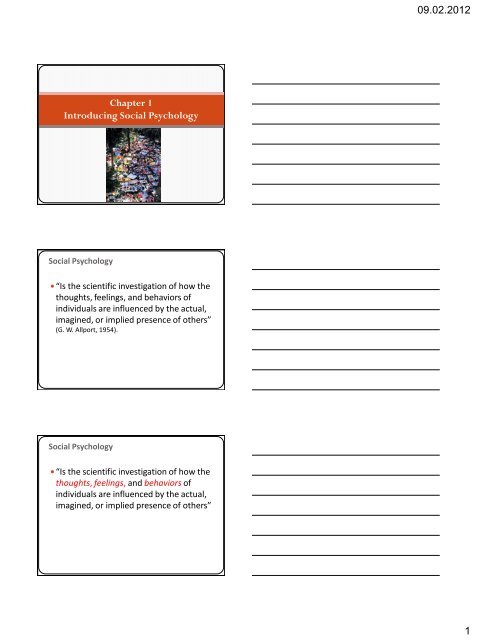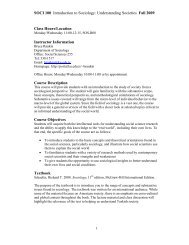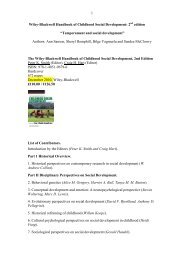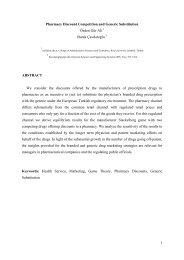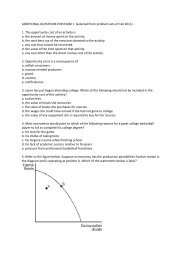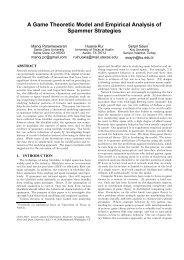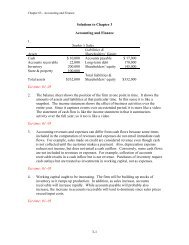Chapter 1 Introducing Social Psychology
Chapter 1 Introducing Social Psychology
Chapter 1 Introducing Social Psychology
Create successful ePaper yourself
Turn your PDF publications into a flip-book with our unique Google optimized e-Paper software.
09.02.2012<strong>Chapter</strong> 1<strong>Introducing</strong> <strong>Social</strong> <strong>Psychology</strong><strong>Social</strong> <strong>Psychology</strong>• “Is the scientific investigation of how thethoughts, feelings, and behaviors ofindividuals are influenced by the actual,imagined, or implied presence of others”(G. W. Allport, 1954).<strong>Social</strong> <strong>Psychology</strong>• “Is the scientific investigation of how thethoughts, feelings, and behaviors ofindividuals are influenced by the actual,imagined, or implied presence of others”1
09.02.2012“ABCs of <strong>Social</strong> <strong>Psychology</strong>”• Affect• Emotions, feelings, and mood• Behavior• Verbal and nonverbal action• Cognition• Thought, sensation, perception, processing, and memory<strong>Social</strong> <strong>Psychology</strong>• “Is the scientific investigation of how the thoughts, feelingsand behaviors of individuals are influenced by the actual,imagined, or implied presence of others”• Philosophy ?• Folk Wisdom /Common sense?<strong>Social</strong> <strong>Psychology</strong>• “Is the scientific investigation of how the thoughts, feelingsand behaviors of individuals are influenced by the actual,imagined, or implied presence of others”• What is “scientific investigation”? How different is it fromother ways of knowing?• A set of procedures used to gather, analyze, and interpretinformation.• Systematic, empirical, objective, logical, testable (falsifiable)• (Mainstream) <strong>Social</strong> psychology is an experimentallybased science.2
09.02.2012<strong>Social</strong> <strong>Psychology</strong>• “Is the scientific investigation of howthe thoughts, feelings and behaviors ofindividuals are influenced by theactual, imagined, or implied presenceof others”• Who is this “others”?At the heart of social psychologyis social influence:• Humans are social animals whose behavior is both influencedby (are products of) and influences (produces) the socialenvironment• Dynamic relation between the social and environment• Individuals is a combination of both social and cognitiveprocesses• Individuals construe situations, or construct own realitiesWhat are other disciplines that studyhuman beings?• Within the <strong>Social</strong> Sciences?• Within <strong>Psychology</strong>?3
09.02.2012Effects• Actions and characteristicsof others• Cognitive processes• Environmental variables• Cultural context• Biological factorsLevel of explanationExample: Studying prejudice• A sociologist - may study how American prejudice towardsJapanese has changed since WWII• A clinical ψist – may test various therapies for people withantisocial personalities who exhibit great degrees of prejudice• A personality ψist – may develop a questionnaire to identifymen who are very high or low in degree of prejudice towardswomen• A social ψist – manipulate exposure to a member of somecategory of people (e.g. Elderly) and measure the thoughts andconcepts that are cognitively oriented (social –cognitive ψ) ormanipulate various kinds of contact between individuals ofdifferent groups and examine the effects of these manipulationson the degree of prejudice exhibited.Important Themes in <strong>Social</strong> <strong>Psychology</strong>1. The power of the situation (social influence)2. The subjective “construction” of realitythe impact of a situation depends upon personal and subjectivemeaningRather than the objective characteristics of the situation- socialpsychologists are interested in people’s construal of their socialenvironment.3. Interplay of motivational and cognitive factorsmotivational – wishes, desires, hopescognitive – the way our minds work4. Applicable to important social issues4
09.02.2012<strong>Social</strong> behavior is the result of the complex interactionbetween the person and the situation• Person :• typically refers to all of the characteristics that theperson carries into a social situation. Includes physicalattributes, attitudes, beliefs, preferences, andpsychological traits.• Situation:• focus on events outside the person. These include bothtemporary features such as environmental demands andlong-laA Brief History of <strong>Social</strong> <strong>Psychology</strong>[<strong>Social</strong>] ψ has a long past, but only a shorthistory• Essentially a 20 th century field• ‘<strong>Social</strong> psychology’ as a term came into common usage aroundthe turn of the 20th century.• 90% of social psychologists who had ever lived were still alive in1979 (Cartright in Brehm, et al, 2005)• In contrast: Personality ψ - Freud, Jung, Adler, Rogers are alllong dead.• Why “long past”?5
09.02.2012[<strong>Social</strong>] ψ has a long past, but only a shorthistory• Essentially a 20 th century field• ‘<strong>Social</strong> psychology’ as a term came into common usage aroundthe turn of the 20th century.• 90% of social psychologists who had ever lived were still alive in1979 (Cartright in Brehm, et al, 2005)• In contrast: Personality ψ - Freud, Jung, Adler, Rogers are alllong dead.• <strong>Social</strong> psychology is interested in old issues• Do individuals perceive reality accurately?• Are people capable of free will, or is behavior is determined?• Are the basic instincts of humans good or evil?Birth and Infancy: 1880s – 1920s• 1875 - W. Wundt (Germany) & W. James (in the US) establishthe first psychology experiments• 1880s-1900s – European scholars were influential• 1898 - First social ψ Experiment by N. Triplett• How social factors effected bicycle riding? (<strong>Social</strong> Facilitation)• 1908- First textbooks contained the phrase “social psychology”in their titles by McDougall & Ross• 1924 – most influential textbook by Floyd Allport• Accepted as the “rise of experimentation in social ψ”1930s - social ψ began to grow as a solid field• Kurt Lewin “Father of <strong>Social</strong> Psy” (1890-1947)• B(ehavior) = P(erson)+ S (ituation)• Muzafer Sherif• Norm formation studies• WW2 and Post war era• Sparked much research (e.g. authoritarian personality,conformity, obedience, persuasion, group dynamics)• Practical applications (e.g. communication, propaganda)• Brain drain from Germany (mainly to the U.S)6
09.02.2012More history• 50s - 60s: social influence• Festinger, Asch, Milgram, Darley & Latane• European researchers regained importance• Studied group dynamics, decision making, etc.• 70s: cognitive revolution• Attribution, interpersonal perception, biases &heuristics• 80s: social cognition is on the rise.• Also social identity, persuasion and new topics like love andrelationships, evolutionary psychology• 90’s decade of the brainContemporary Themes in <strong>Social</strong><strong>Psychology</strong>• <strong>Social</strong> Cognition• Biology and the Brain• Focus on Self• Focus on Conflict<strong>Social</strong> <strong>Psychology</strong>and <strong>Social</strong> Problems<strong>Social</strong> psychological theories about human behaviorhave been applied to a range of contemporaryproblems, including:• prejudice• energy shortages• AIDS• unhealthy habits• violence in schools7
09.02.2012Why People Study <strong>Social</strong><strong>Psychology</strong>• Curiosity About People• Experimental Philosophy• Making the World Better• Applied Research• <strong>Social</strong> <strong>Psychology</strong> is FunHow Much of <strong>Social</strong><strong>Psychology</strong> Is True?• Self-Correcting Nature of Science• Replication• Reliance on Student Samples• Cultural Relativity• Western cultures dominate social psychologyresearch• Cultural differences may be substantial andimportantResources:• Scholarly Journals• Journal of Personality and <strong>Social</strong> <strong>Psychology</strong> (JPSP)• Personality and <strong>Social</strong> <strong>Psychology</strong> Bulletin (PSPB)• Journal of Experimental <strong>Social</strong> <strong>Psychology</strong> (JESP)• Psych Bull, Psych Review, PSPR, AESP• Not google! / But googlescholar• Societies• Society for Personality and <strong>Social</strong> <strong>Psychology</strong> (SPSP)• Society of Experimental <strong>Social</strong> Psychologists (SESP)• www.socialpsychology.org• In-mind.org8


